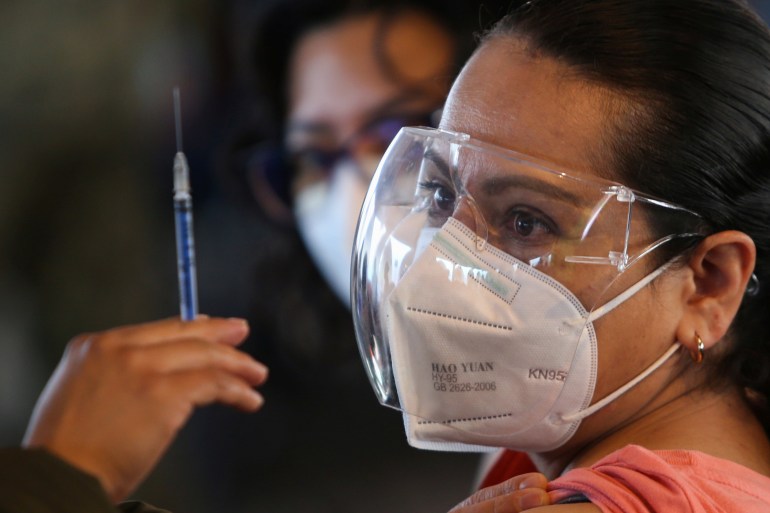COVID cases drop in Americas, but ‘glaring gaps’ in jabs: PAHO
The sharp drop in US COVID-19 cases is a ‘testament’ to the importance of vaccines, says the head of the Pan American Health Organization.

While COVID-19 cases have been dropping overall in the Americas, the head of the Pan American Health Organization (PAHO) has urged greater vaccine access to tackle infections and protect vulnerable health networks across the region.
During a weekly news briefing on Wednesday, PAHO Director Carissa Etienne said coronavirus-related deaths in the Caribbean islands of Bahamas, Haiti, and Trinidad and Tobago doubled in the last week.
Keep reading
list of 3 itemsBrazil’s Amazonas state braces for another COVID surge
Continued increase in COVID cases and deaths in LatAm: PAHO
Over the last week, PAHO said 1.2 million new coronavirus cases and 31,000 deaths were recorded in the region.
“We’ve seen COVID infections drop throughout the region in the last month, offering some reprieve to our beleaguered health systems,” Etienne said.
But she pointed out that intensive care unit occupancy rates in parts of Brazil and Colombia are at about 90 percent, “a sign that these communities are still at a high risk of not getting the care that they need”.

Brazil has been particularly hard hit by COVID-19, registering more than 439,000 deaths – second only to the United States, according to Johns Hopkins University data.
However, Etienne said the most dramatic change has been in the US, where cases have dropped significantly after the country made headway in its vaccination campaign.
Just more than 60 percent of adult Americans have received at least one shot, according to the US Centers for Disease Control and Prevention (CDC), and 73 percent of those above 65 years are fully vaccinated.
“The progress we’re seeing in the United States is a testament to the power of safe and effective COVID vaccines, but it underscores the vital importance of accelerating access to vaccines throughout our region,” Etienne said.
More than 400 million coronavirus jabs have been administered in the Americas overall, but the “lion’s share” has gone to the US, she said.
Etienne said “glaring gaps” in access to vaccines in Latin America and the Caribbean are a symptom of the region’s “overdependence” on imports for essential medical supplies.

“We urgently need more vaccines for Latin America and the Caribbean, a region that has been put to the test by this pandemic.”
Etienne said only 3 percent of people in Latin America have been fully vaccinated and emphasised the importance of expanding the region’s capacity to manufacture vaccines, rather than relying on the import of ingredients.
She said Argentina, Brazil, Mexico and Cuba have manufacturing plants that are well-positioned and well-equipped to produce COVID-19 vaccines.
“Luckily, we have some of the building blocks to make it happen: strong academic and research institutions, existing manufacturing capacity, robust regulatory systems, and an effective mechanism of procurement,” Etienne said.
Brazil announced this week that it expects to receive enough COVID-19 vaccine ingredients from China to manufacture as many as 25 million doses of AstraZeneca and Sinovac jabs.
In Argentina, which is seeing a surge in coronavirus infections, the Reuters news agency reported that 18 percent of the population had received one jab to date, while only 4.5 percent of Argentines are fully inoculated.